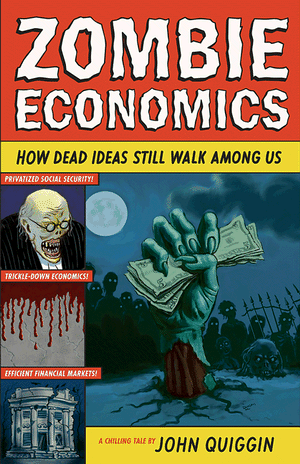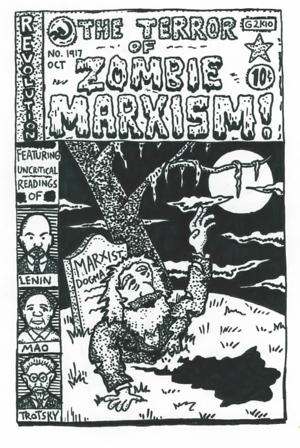Zombie Economics

A couple of years ago (July 2018) I gave a talk at a Students for Liberty conference on “Zombie Economics” with particular reference to the Marxist “manifestation” of this intellectual beast which refuses to die, no matter how many times it has been “killed” (intellectually speaking of course). It has been the revolutionary Marxists who have done most of the killing once they have seized political power and find that their utopian economic schemes fail to work as planned). As of 1997, the total of deaths caused by the attempt to impose Marxist economic polices since the experiment began in 1917 in Russia is about 94 million and rising. It would be much more if one included other variants of socialism such as “national” socialism. [See, Stéphane Courtois, Andrzej Paczkowski, Nicolas Werth, et al., The Black Book of Communism: Crimes, Terror, Repression (Harvard University Press, 1997)].
[See “ How to kill the Marxist zombie once and for all: or, how you can learn to stop worrying about S&M on campus ,” YAL Conference, Washington D.C. 26 July, 2018.]

Of course, Marxism is not the only variant of “zombie economics” which advocates of the free market have had to deal with. And economists from other schools of thought naturally have the opposite view. They, like the Keynesian economist from the University of Queensland, John Quiggen, think that free market ideas should also be described as “zombie economics”, or as he put it in the subtitle of his book of the same title, “how dead ideas still walk among us.” The specific examples of these ideas he gave prominence on the front cover were “privatized social security,” “trickle-down economics,” and “efficient financial markets.”1.
The most prevalent form of zombie economics until recently is “protectionism”, which is really a euphemism for special privileges granted to some domestic/national producers and their workers in order to shield or “protect” them from competitive forces and thus guarantee the continuation of their profits and wages, and to prevent by force other domestic consumers and producers and their workers from buying cheaper (usually foreign) alternatives. Or in other words, every act of “protection” for some must inevitably cause “harm” to others – which is a classic example of Frédéric Bastiat’s notion of “the seen” (protection of some) and “the unseen” (harm to others). [See my blogpost on Bastiat on the Seen and the Unseen (29 May, 2020) and my paper Bastiat on the Seen and the Unseen: An Intellectual History.]
However a second manifestation of zombie economics has appeared in recent years, that of a resurgence of interest in fully fledged “socialism”, even Marxism. This coincided with the 100th anniversary of the Bolshevik Revolution of 1917 in Russia which was very positively commented upon in papers like the New York Times; the acclaim for the French economist Thomas Picketty’s book Capital in the Twenty-First Century (Harvard, 2017) (which was intended to be an update to Marx’s volume of same name which appeared in 1867); and the appearance of the film “The Young Marx” (2017), funded by numerous state film and TV organizations in the European Union, to celebrate the 200th anniversary of the Marx’s birth in 1818; to cite only a few examples.
Socialist Economic Thought before it became Zombified
Given this revived interest in things Socialist or Marxist I want to revisit some of the key socialist and Marxist thinkers of the past, to see what they actually thought could and should replace the “chaos of the market” and the “immiseration of the working class” by “predatory capitalism,” and the response of classical liberals and political economists of the time to these ideas. I have prepared a summary of socialist criticisms of private property, and the free market; and a similar list of CL answers to these criticisms and their critique of socialism. I will detail these in future posts.
If one were feeling charitable towards the “ideal” of socialism (which I am not) one might take the view of J.S. Mill who argued that the ideal of classical liberalism can be compared with the ideal of socialism (which was possible at his time – the 1850s and 1860s); but the reality of the free market could not be compared to the reality of socialism, as the latter had not yet been put into practice. The 20th century would provide that “reality check” which was not available in Mill’s own lifetime. We now I think have all the evidence we need to make that comparison. By 1920, as Ludwig von Mises conclusively demonstrated in his essay on “Economic Calculation under Socialism”, the jury was in.
In short, I have noticed is two things about the early history of socialist thought: the general weakness (even naivety and absurdity) of the ideas put forward on behalf of socialism beginning largely in the 1820s and reaching a pinnacle in the 1840s on the eve of the 1848 Revolution, and the enduring strength of the CL critique which also began at this time. When Marx attempted to make socialism more “scientific” with his three volume book on Das Kapital (1869-96) things in my view did not improve, as Böhm-Bawerk demonstrated in his demolition of Marxist economic theory when Marx’s third and final volume appeared posthumously in print. It makes one wonder why these zombie economic ideas continue to be advocated today and why the liberal critique continues to be ignored.
Historically, I think we can identify the following different kinds of socialism which have been advocated at different times:
- Utopian socialism: “dropping out” or withdrawing from capitalist society in order to form socialist communities which would be a model for the future; the formation of voluntary socialist communities based upon the ideas of Robert Owen and Charles Fourier many of which were located in the United States
- Democratic socialism, or “socialism from below” where elected politicians work within capitalist society, to use their numbers to control parliament, and reform it from within; examples include
- Louis Blanc’s National Workshops – street activism & “direct action” (Feb.-May 1848) ; state ownership and/or funding of factories and “workshops” in order to guarantee a job for all (the so-called “le droit au travail” (the right to work, or right to a job) as advocated by Victory Considerant and Louis Blanc in the 1840s
- the rise of “Fabian Socialism” in the 1880s and the formation of the Labour Party in Britain (1900)
- “social democracy”: the formation of Socialist Parties in France (1879) and Germany (Social Democratic Party in 1875)
- the welfare state socialism wich emerged in the US (the “New Deal”) and Western Europe during the 1930s and late 1940s
- Green socialism (The Greens) in the late 20th century up unit the present, and their proposed “Green New Deal” which is explicitly based upon the comprehensive “socialist” (or “interventionist”) measures of FDR
- Bureaucratic socialism: “socialism from above” – imposed by a charismatic political leader who appeals to workers directly, thus by-passing parliament
- state socialism (Staatssozialismus, Socialisme d’état)
- the “Bonapartism” of Napoléon III 1852-1870
- Ferdinand Lassalle and perhaps also Otto von Bismarck in Germany, and
- Claudio Jennet in France
- war socialism (Kriegssozialismus) during WW1
- Adolph Hitler and “Nationalsozialistische Deutsche Arbeiterpartei” (NSDAP) (the National Socialist German Workers Party, or Nazi Party) 1920-1945
- what Ludwig von Mises called ”Interventionism” and which in one manifestation came in the form of the hybrid welfare-warfare state
- Revolutionary socialism: a more extreme version of bureaucratic and war socialism where the state “owns” the means of production under the control of a “dictatorship of the proletariat” (die Diktatur des Proletariats) which has come to power by means of a revolution and the violent seizure of state power; this had two versions:
- Karl Marx – revolution & dictatorship of proletariat (failure of 1848 showed him need for “dictatorship” to prevent electoral backlash or coup d’état); had to happen in most advanced industrialized economies first; socialist would take over the economic system- as advocated by Marx in the Communist Manifesto (1848)
- Lenin – who broke with Marx’s vision as he believed communism could be created in a relatively backward, undeveloped country like Russia; became commonplace in 20thC
- Lenin and Bolsheviks in Russia 1917
- Mao Zedong in China 1949
- Fidel Castro in Cuba 1959
The Classical Liberal Response to the Rise of Socialism
Classical liberals and political economists responded to the challenge of socialism in the following periods when socialist ideas were seen as a growing threat:
- 1840s France when organised socialism first made an appearance in the 1848 Revolution
- the ideas of Victor Considerant, Louis Blanc, and Joseph Proudhon were criticized by Frédéric Bastiat, Michel Chevalier, and Gustave de Molinari
- 1870s, 1880s and 1890s in western Europe when organised socialist parties began to emerge
- Germany: the ideas of Karl Marx were criticized by the economist Eugen von Böhm-Bawerk; those of Auguste Bebel by the politician Eugen Richter
- England: George Bernard Shaw and the “Fabian socialists” were criticized by Herbert Spencer, Thomas Mackay, Wordsworth Donisthorpe, and Auberon Herbert
- France: the economists Jennet and Gide were criticized by the economists and politicians Frédéric Passy, Yves Guyot, Paul Leroy-Beaulieu
- 1920s and 1930s: when the Austrian economist Ludwig von Mises first exposed the serious economic weaknesses in Marxist/Bolshevik central planning
- Lenin and Stalin vs. Mises and Hayek
- 1980s and 1990s: a new younger generation of Austrian economists (Don Lavoie and Peter Boettke) examined weakness of planned economies on the eve of their collapse
I have begun to assemble a collection of works by socialist writers and their critics on my website to document the strengths/weaknesses of the socialist position and their enduring appeal; as well as the often devastating critique offered by classical liberals and the political economists. I will begin with “the French Connection” in another post, before moving on to late 19th century English, German, and French socialist thought.
- John Quiggin, Zombie Economics: How Dead Ideas Still Walk among Us. With a new chapter by the author (Princeton U.P., 2012). [↩]
